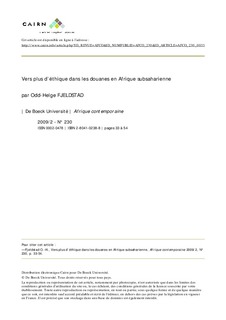Vers plus d'éthique dans les douanes en Afrique subsaharienne; The pursuit of integrity in customs: experiences from sub-Saharan Africa
Journal article, Peer reviewed
Permanent lenke
http://hdl.handle.net/11250/2475288Utgivelsesdato
2009-08-01Metadata
Vis full innførselSamlinger
- Publications [1488]
Sammendrag
This paper examines recent experiences from sub-Saharan Africa in combating corruption in customs. It argues that integrity reforms have been too focused on reforming formal institutions, and too little attention has been paid to the political economy of reforms and the role of informal institutions. In many customs administrations, patronage runs through networks grounded on ties of kinship and community origin. Patronage undermines the implementation of policies and rules-of-law more generally. Opportunities for accessing illegal income tend to become institutionalised, leading to the creation of parallel organisations within customs, in which posts are valued essentially on the basis of the illicit gains to which they provide access. In such settings, customs officers are torn between compliance with abstract bureaucratic norms and concrete expectations of their networks of social belonging. Accordingly, policy initiatives should focus more on measures that reduce the possibility or attraction of favouritism versus acting in the general public interest. This calls for anti-corruption efforts based on thorough analysis of the political economy of customs, in order to understand the interests and incentives of key players.
